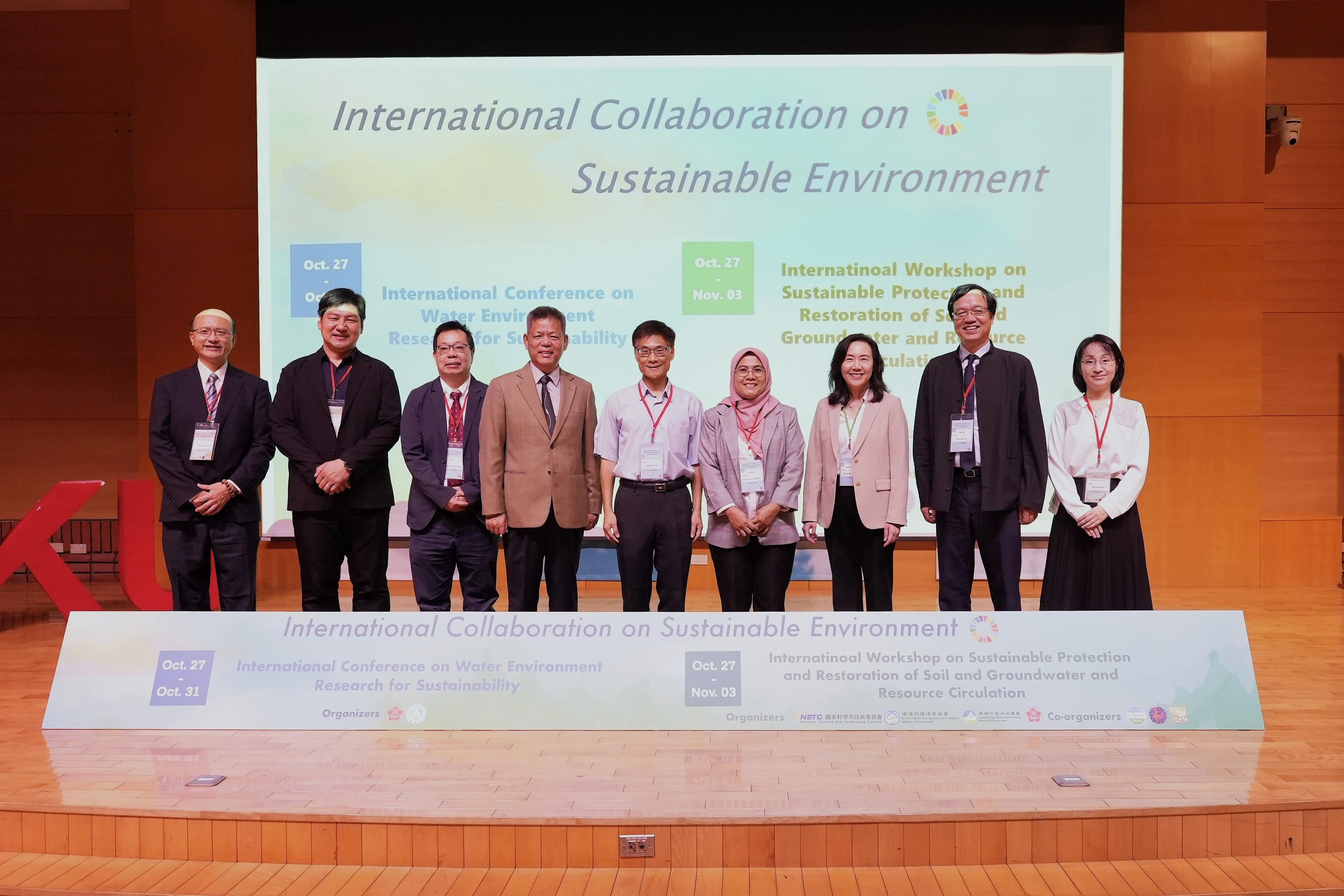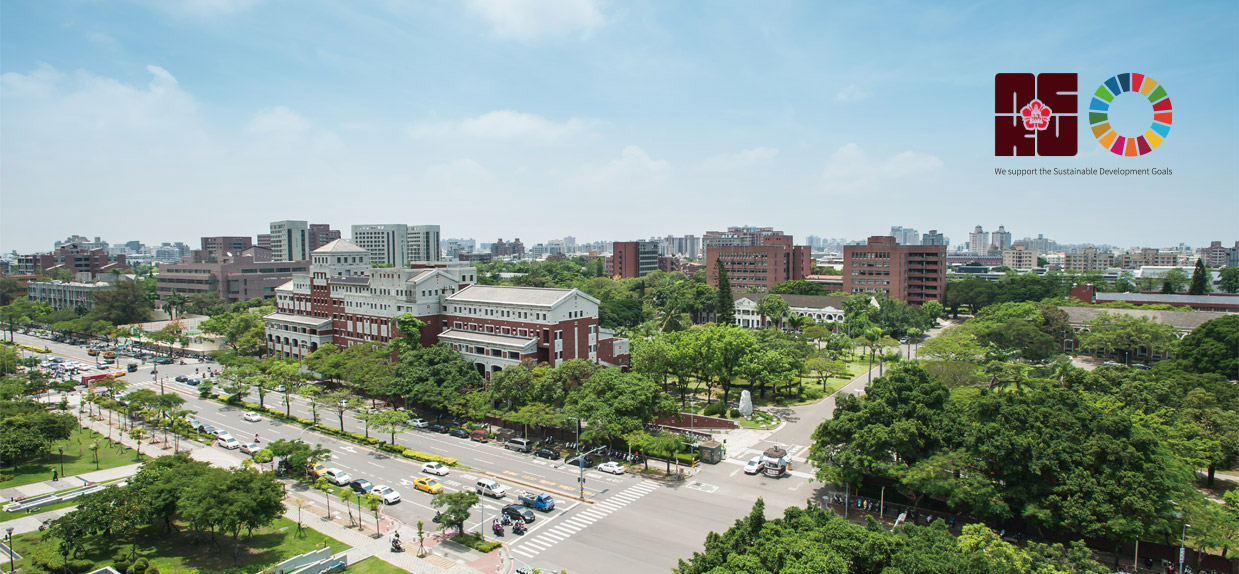Regular Maintenance and Water Safety
National Cheng Kung University (NCKU) has established regular maintenance and inspection procedures for its buildings and equipment, including water towers, reservoirs, and drinking fountains. These protocols ensure both internal and external hygiene, and surroundings are kept free of debris and contaminants to guarantee the purity and safety of campus water.
Laboratory Wastewater Management
For wastewater discharge, NCKU adheres to the national "Effluent Standards" and has instituted internal wastewater management regulations. Wastewater from laboratories is centrally treated, classified, and collected monthly for proper disposal, achieving the goal of water pollution prevention.
Stormwater and Domestic Wastewater Recycling
Stormwater and domestic wastewater from across campus are processed through eight on-campus treatment facilities. The recycled water is then repurposed for irrigating campus greenery, preventing pollutants from entering the water cycle and conserving resources through reuse for multiple purposes.
Research and Innovation in Water Quality Monitoring
NCKU hosted the “International Conference on Water Environment Research for Sustainability” and the “International Workshop on Sustainable Protection and Restoration of Soil and Groundwater and Resource Circulation”, focusing on the sustainable use and regeneration of soil and water resources. The events attracted around 50 experts and scholars from industry, government, and academia across 13 countries.
National Cheng Kung University (NCKU) has established regular maintenance and inspection procedures for its buildings and equipment, including water towers, reservoirs, and drinking fountains. These protocols ensure both internal and external hygiene, and surroundings are kept free of debris and contaminants to guarantee the purity and safety of campus water.
Laboratory Wastewater Management
For wastewater discharge, NCKU adheres to the national "Effluent Standards" and has instituted internal wastewater management regulations. Wastewater from laboratories is centrally treated, classified, and collected monthly for proper disposal, achieving the goal of water pollution prevention.
Stormwater and Domestic Wastewater Recycling
Stormwater and domestic wastewater from across campus are processed through eight on-campus treatment facilities. The recycled water is then repurposed for irrigating campus greenery, preventing pollutants from entering the water cycle and conserving resources through reuse for multiple purposes.
Research and Innovation in Water Quality Monitoring
NCKU hosted the “International Conference on Water Environment Research for Sustainability” and the “International Workshop on Sustainable Protection and Restoration of Soil and Groundwater and Resource Circulation”, focusing on the sustainable use and regeneration of soil and water resources. The events attracted around 50 experts and scholars from industry, government, and academia across 13 countries.
- NCKU Building and Building Facility Maintenance and Inspection Regulations
 NCKU, in accordance with the "Building and Building Facility Maintenance and Inspection Regulations," conducts regular maintenance and inspections of campus buildings and facilities, covering water supply systems, water pressure, pipe leaks, and the temperature and filter replacement of drinking fountains. Unit supervisors and maintenance personnel conduct inspections collaboratively, while the Office of General Affairs coordinates major repairs and supervision. Through systematic management and rigorous maintenance, NCKU effectively prevents water system contamination and ensures safe drinking water for students, staff, and visitors.
NCKU, in accordance with the "Building and Building Facility Maintenance and Inspection Regulations," conducts regular maintenance and inspections of campus buildings and facilities, covering water supply systems, water pressure, pipe leaks, and the temperature and filter replacement of drinking fountains. Unit supervisors and maintenance personnel conduct inspections collaboratively, while the Office of General Affairs coordinates major repairs and supervision. Through systematic management and rigorous maintenance, NCKU effectively prevents water system contamination and ensures safe drinking water for students, staff, and visitors.
- NCKU Regulations for Wastewater Management in Buildings and Laboratories
 NCKU has established comprehensive regulations to prevent pollution of water resource systems. Covering both laboratory and general wastewater, the regulations require proper collection, storage, and treatment, and compliance with water quality standards set by the Environmental Protection Administration and local sewer authorities. Each building’s management unit is responsible for supervision, and violations must be corrected with fines imposed. Through systematic management and monitoring, NCKU actively safeguards campus and surrounding water resources, demonstrating its commitment to environmental protection and sustainable water use.
NCKU has established comprehensive regulations to prevent pollution of water resource systems. Covering both laboratory and general wastewater, the regulations require proper collection, storage, and treatment, and compliance with water quality standards set by the Environmental Protection Administration and local sewer authorities. Each building’s management unit is responsible for supervision, and violations must be corrected with fines imposed. Through systematic management and monitoring, NCKU actively safeguards campus and surrounding water resources, demonstrating its commitment to environmental protection and sustainable water use.- Soil and groundwater quality sampling and testing
 The Water Quality Laboratory at NCKU’s Hydraulic Experiment Center conducts soil and groundwater sampling and analysis following EPA standards, covering heavy metals, organic pollutants, and microbial indicators. Combining advanced equipment with professional expertise, the lab systematically monitors and manages water quality, actively preventing pollution of campus and surrounding water resources while demonstrating NCKU’s commitment to sustainable water management.
The Water Quality Laboratory at NCKU’s Hydraulic Experiment Center conducts soil and groundwater sampling and analysis following EPA standards, covering heavy metals, organic pollutants, and microbial indicators. Combining advanced equipment with professional expertise, the lab systematically monitors and manages water quality, actively preventing pollution of campus and surrounding water resources while demonstrating NCKU’s commitment to sustainable water management.- Maintenance Responsibilities for Campus Elevators, Water Dispensers, Generators, and Boilers
 NCKU maintains a full-responsibility system for campus drinking fountains, conducting bi-monthly inspections and servicing. Maintenance includes surface cleaning, water quality testing, system checks, and filter replacement, with any malfunctions repaired or replaced by the vendor. This rigorous management ensures safe drinking water for students, staff, and visitors, reflecting NCKU’s commitment to water resource protection and public health.
NCKU maintains a full-responsibility system for campus drinking fountains, conducting bi-monthly inspections and servicing. Maintenance includes surface cleaning, water quality testing, system checks, and filter replacement, with any malfunctions repaired or replaced by the vendor. This rigorous management ensures safe drinking water for students, staff, and visitors, reflecting NCKU’s commitment to water resource protection and public health.- NCKU hosted the “International Conference on Water Environment Research for Sustainability” and the “International Workshop on Sustainable Protection and Restoration of Soil and Groundwater and Resource Circulation” in 2024
 NCKU hosted the “International Conference on Water Environment Research for Sustainability” and the “International Workshop on Sustainable Protection and Restoration of Soil and Groundwater and Resource Circulation”, focusing on the sustainable use and regeneration of soil and water resources. The events attracted around 50 experts and scholars from industry, government, and academia across 13 countries. NCKU Vice President for Research and Development Chuan-Pu Liu expressed hope that through knowledge sharing, the university could foster international models of sustainable collaboration and advance both research and practical solutions for global water issues.
NCKU hosted the “International Conference on Water Environment Research for Sustainability” and the “International Workshop on Sustainable Protection and Restoration of Soil and Groundwater and Resource Circulation”, focusing on the sustainable use and regeneration of soil and water resources. The events attracted around 50 experts and scholars from industry, government, and academia across 13 countries. NCKU Vice President for Research and Development Chuan-Pu Liu expressed hope that through knowledge sharing, the university could foster international models of sustainable collaboration and advance both research and practical solutions for global water issues.

